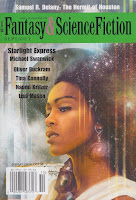
★★★☆☆ Average
(Modern African Fantasy; Àlá Stories) Wura has miscarried three times, so she decides to make a child from clay and lightening. (4,273 words; Time: 14m)
Recommended By: SFRevu+1
"We Are Born," by Dare Segun Falowo [bio] (edited by C.C. Finlay), appeared in Magazine of Fantasy & Science Fiction issue 09-10|17, published on September 1, 2017 by Spilogale Inc.
Mini-Review (click to view--possible spoilers)
Pro: The narrator considers herself human, and, at the end, she becomes human—complete with the power of speech.
The analogy with Pinocchio is hard to miss, but it’s superficial. Pinocchio was a bad boy from day 1 and only became a real boy once he’d suffered and earned it. The narrator is, by all accounts, a good girl.
Con: She's a good girl who does nothing to earn her transformation at the end. She’s a very passive protagonist.
Other Reviews: Search Web, Browse Review Sites (Issue 09-10|17)
Dare Segun Falowo Info: Interviews, Websites, ISFDB, FreeSFOnline
Follow RSR on Twitter, Facebook, RSS, or E-mail.
The analogy with Pinocchio is hard to miss, but it’s superficial. Pinocchio was a bad boy from day 1 and only became a real boy once he’d suffered and earned it. The narrator is, by all accounts, a good girl.
Con: She's a good girl who does nothing to earn her transformation at the end. She’s a very passive protagonist.
Other Reviews: Search Web, Browse Review Sites (Issue 09-10|17)
Dare Segun Falowo Info: Interviews, Websites, ISFDB, FreeSFOnline
Follow RSR on Twitter, Facebook, RSS, or E-mail.
I found this story's twist to be deeply powerful, but also very ambiguous. It confirms that the girl is what she's said to be -- a spirit who, by nature, will be born to her mother, and die, again and again. I'm not at all sure that the end of the story is a happy one -- as far as I can tell, it could well be just another link in the chain; another twist of the knife.
ReplyDeleteThe earlier births and the clay child were all daughters. The spirit mentions feeling "askew" in the clay body. Since the child born at the end is a boy, the spirit stays. The first sentence reflects this too:
Delete"Once, in a moment before this final birth, my mother molded me to life."
I take "final birth" to mean the one at the end of the story. And indicating he won't be leaving this time.
That's an interesting angle. I definitely missed that on the first read.
DeleteOooh. Greast points; thank you :D
Delete